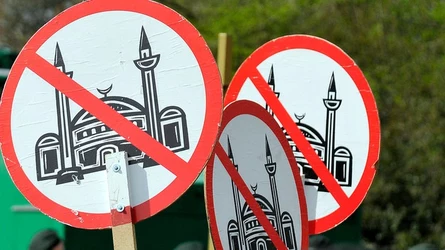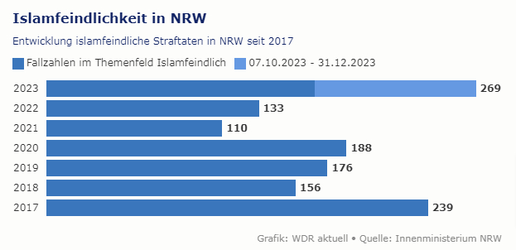L | A (Translated with ChatGPT)
By Samuel Acker

After approximately three years of preparation, a state reporting center for anti-Muslim incidents is set to launch in North Rhine-Westphalia in just a few months. According to information obtained exclusively by WDR from a source closely involved in establishing the center, the launch is planned for "March, at the latest April."
The responsible NRW Integration Ministry was somewhat less specific when asked, stating that the reporting center would begin operation "in spring 2025."
At the same time as the launch of the "Reporting Center for Anti-Muslim Racism" (MEDAR), three additional facilities will become operational, allowing reports of discrimination even below the threshold of criminal liability.
These include a center for anti-Romani racism (Antiziganism), targeting Sinti and Roma, one for queerphobia, and another addressing "anti-Black, anti-Asian, and other forms of racism." North Rhine-Westphalia has already had a dedicated reporting center for antisemitic incidents in place since April 2022.
NRW Leads the Way in Germany
According to investigations by WDR COSMO, North Rhine-Westphalia is the first federal state in Germany to establish a dedicated state-level reporting center for anti-Muslim incidents. Rough estimates suggest that over 1.7 million Muslims reside in the region.
The reporting center for anti-Muslim hostility was first announced almost three years ago.
In January 2022, several Muslim graves were desecrated at the main cemetery in Iserlohn—headstones were toppled, and flowers destroyed. Just days later, the then CDU-FDP state government pledged to establish a state-funded reporting center for anti-Muslim incidents, along with similar centers to address other forms of discrimination.
Initially Designed as an Online Platform
The reporting center for anti-Muslim hostility is initially planned to operate exclusively as an online platform, explains Kemal Bozay from interKultur e.V. in Cologne, one of the two organizations managing MEDAR. Individuals who have experienced anti-Muslim discrimination can describe their experiences through a contact form. For example:
"Three weeks ago, I was in Gelsenkirchen-Buer. Three men saw that I was wearing a headscarf and shouted, 'Go back to Anatolia!' One of them even gave me the middle finger."
This incident would then be documented anonymously, meaning, for example, that the names of the affected individuals and any alleged perpetrators would be removed. "If we determine that this involves a criminal offense – such as, for example, insult or bodily harm – we inform the person, if they have left contact details, that they can also contact the police."

Development of Islamophobic crimes in NRW since 2017
In fact, there has been an increase in incidents against Muslims at the police level. According to NRW's statistics on politically motivated crime, there were more than twice as many offenses in the "Islamophobic" category in 2023 compared to the previous year. With a total of around 270 crimes, the level still seems relatively low considering the estimated 1.7 million Muslims in NRW.
Nevertheless, the rapid rise has alarmed many members of the Muslim community, who report a generally tense atmosphere towards them.
Experts point out that many victims of anti-Muslim crimes do not report the incidents, and not every instance of discrimination reaches the threshold of a criminal offense. For this reason, reporting offices are important to gain a more accurate picture of how often discrimination actually occurs.
The AfD senses a "spirit of denunciation"
At the same time, social scientist Kemal Bozay emphasizes the importance of pointing out that the reporting office is not a form of "judicial authority" or anything similar. "That is not our task. We want to offer people an easy way to listen, so they can tell us what has happened to them."
The reporting office also does not have the personnel capacity to investigate whether an incident actually occurred as described. And If a person describes a potentially criminal act but does not leave contact details, MEDAR does not independently forward the account to the police, he stresses.
A few months ago, the AfD in NRW criticized in a motion that the reporting office against Islamophobia – as well as the three other new reporting offices – could promote a "spirit of denunciation." It was too easy with them to slander innocent people. The party therefore called for an immediate halt to the establishment of these reporting offices.
In September, their motion was rejected by all other factions in the NRW state parliament.
Josefine Paul: "Dark areas should be illuminated"
Kemal Bozay says in an interview that at the reporting office he co-manages, identifying elements such as names, addresses, etc., are always deleted or anonymized when reports are made.
The state government also repeatedly emphasizes that any reports made to the reporting offices are only documented anonymously, ensuring that no conclusions can be drawn about the alleged perpetrators of incidents. This applies even if individuals report experiencing anti-Muslim discrimination via social media, such as through a post or direct message.
However, the state government's previous explanations do not clarify whether, for example, screenshots of alleged online discrimination can be directly uploaded to the reporting offices – and how the subsequent anonymization process would specifically work.
NRW Integration Minister Josefine Paul (Greens) emphasized in an interview with WDR COSMO in the summer that reporting offices against various forms of discrimination are necessary "because there are still significant dark areas" – meaning many affected individuals, for example, have not reported incidents to the police so far.
By better illuminating how strongly, for instance, Islamophobia occurs in everyday life and in which situations, the reporting offices could help identify stronger preventive measures – such as addressing prejudices more directly in specific locations or institutions.
According to the NRW Ministry of Integration, 180,000 euros in state funds are planned for each of the four new reporting offices for the upcoming year.
By Samuel Acker

After approximately three years of preparation, a state reporting center for anti-Muslim incidents is set to launch in North Rhine-Westphalia in just a few months. According to information obtained exclusively by WDR from a source closely involved in establishing the center, the launch is planned for "March, at the latest April."
The responsible NRW Integration Ministry was somewhat less specific when asked, stating that the reporting center would begin operation "in spring 2025."
At the same time as the launch of the "Reporting Center for Anti-Muslim Racism" (MEDAR), three additional facilities will become operational, allowing reports of discrimination even below the threshold of criminal liability.
These include a center for anti-Romani racism (Antiziganism), targeting Sinti and Roma, one for queerphobia, and another addressing "anti-Black, anti-Asian, and other forms of racism." North Rhine-Westphalia has already had a dedicated reporting center for antisemitic incidents in place since April 2022.
NRW Leads the Way in Germany
According to investigations by WDR COSMO, North Rhine-Westphalia is the first federal state in Germany to establish a dedicated state-level reporting center for anti-Muslim incidents. Rough estimates suggest that over 1.7 million Muslims reside in the region.
The reporting center for anti-Muslim hostility was first announced almost three years ago.
In January 2022, several Muslim graves were desecrated at the main cemetery in Iserlohn—headstones were toppled, and flowers destroyed. Just days later, the then CDU-FDP state government pledged to establish a state-funded reporting center for anti-Muslim incidents, along with similar centers to address other forms of discrimination.
Initially Designed as an Online Platform
The reporting center for anti-Muslim hostility is initially planned to operate exclusively as an online platform, explains Kemal Bozay from interKultur e.V. in Cologne, one of the two organizations managing MEDAR. Individuals who have experienced anti-Muslim discrimination can describe their experiences through a contact form. For example:
"Three weeks ago, I was in Gelsenkirchen-Buer. Three men saw that I was wearing a headscarf and shouted, 'Go back to Anatolia!' One of them even gave me the middle finger."
This incident would then be documented anonymously, meaning, for example, that the names of the affected individuals and any alleged perpetrators would be removed. "If we determine that this involves a criminal offense – such as, for example, insult or bodily harm – we inform the person, if they have left contact details, that they can also contact the police."

Development of Islamophobic crimes in NRW since 2017
In fact, there has been an increase in incidents against Muslims at the police level. According to NRW's statistics on politically motivated crime, there were more than twice as many offenses in the "Islamophobic" category in 2023 compared to the previous year. With a total of around 270 crimes, the level still seems relatively low considering the estimated 1.7 million Muslims in NRW.
Nevertheless, the rapid rise has alarmed many members of the Muslim community, who report a generally tense atmosphere towards them.
Experts point out that many victims of anti-Muslim crimes do not report the incidents, and not every instance of discrimination reaches the threshold of a criminal offense. For this reason, reporting offices are important to gain a more accurate picture of how often discrimination actually occurs.
The AfD senses a "spirit of denunciation"
At the same time, social scientist Kemal Bozay emphasizes the importance of pointing out that the reporting office is not a form of "judicial authority" or anything similar. "That is not our task. We want to offer people an easy way to listen, so they can tell us what has happened to them."
The reporting office also does not have the personnel capacity to investigate whether an incident actually occurred as described. And If a person describes a potentially criminal act but does not leave contact details, MEDAR does not independently forward the account to the police, he stresses.
A few months ago, the AfD in NRW criticized in a motion that the reporting office against Islamophobia – as well as the three other new reporting offices – could promote a "spirit of denunciation." It was too easy with them to slander innocent people. The party therefore called for an immediate halt to the establishment of these reporting offices.
In September, their motion was rejected by all other factions in the NRW state parliament.
Josefine Paul: "Dark areas should be illuminated"
Kemal Bozay says in an interview that at the reporting office he co-manages, identifying elements such as names, addresses, etc., are always deleted or anonymized when reports are made.
The state government also repeatedly emphasizes that any reports made to the reporting offices are only documented anonymously, ensuring that no conclusions can be drawn about the alleged perpetrators of incidents. This applies even if individuals report experiencing anti-Muslim discrimination via social media, such as through a post or direct message.
However, the state government's previous explanations do not clarify whether, for example, screenshots of alleged online discrimination can be directly uploaded to the reporting offices – and how the subsequent anonymization process would specifically work.
NRW Integration Minister Josefine Paul (Greens) emphasized in an interview with WDR COSMO in the summer that reporting offices against various forms of discrimination are necessary "because there are still significant dark areas" – meaning many affected individuals, for example, have not reported incidents to the police so far.
By better illuminating how strongly, for instance, Islamophobia occurs in everyday life and in which situations, the reporting offices could help identify stronger preventive measures – such as addressing prejudices more directly in specific locations or institutions.
According to the NRW Ministry of Integration, 180,000 euros in state funds are planned for each of the four new reporting offices for the upcoming year.